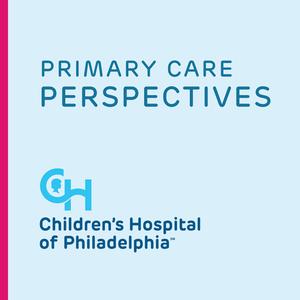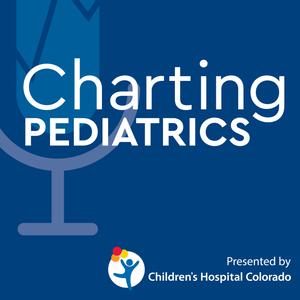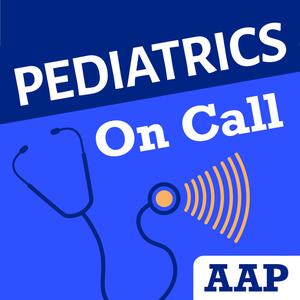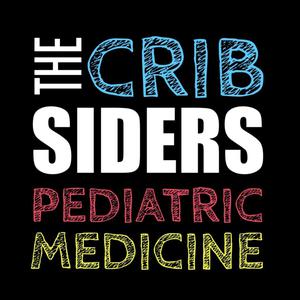
Primary Care Perspectives
Children’s Hospital of Philadelphia
Podcast by Children's Hospital of Philadelphia
- 22 minutes 3 secondsRetinoblastoma- (Episode 184)
Although relatively rare with 300 cases per year in the United States, we look for retinoblastoma at every well visit. Amish Shah, MD, PhD, a neuro-oncologist at CHOP, educates us on the epidemiology, presentation, management, and prognosis of retinoblastoma, as well as how partnership between Children's Hospital of Philadelphia and Wills Eye Hospital has improved outcomes for children.
6 January 2025, 3:44 pm - 21 minutes 39 secondsResponding to In-Flight Emergencies: Is there a Doctor On-Board? (Episode 183)
Become better prepared to respond to an emergency situation on an airplane through the experience of an emergency medicine physician at Nemours Children's Health, Steven Selbst, MD. In this episode, Dr. Selbst and Dr. Lockwood discuss why healthcare providers should respond to emergencies, the most common types of emergencies, what supplies are on board, and the resources available to responders.
18 December 2024, 2:11 pm - 31 minutes 40 secondsIron-deficiency Anemia (Episode 182)
Iron plays a crucial role in many vital functions and in this episode, Char Witmer, MD, Clinical Director of Hematology at Children's Hospital of Philadelphia, gets us excited about hepcidin, ferritin, reticulocyte counts, and more! We discuss why premature infants are particularly vulnerable to iron-deficiency anemia, how to provide supplementation, dietary sources of iron, laboratory measurements of iron, and more in this fascinating episode on anemia.
11 December 2024, 4:34 pm - 32 minutes 19 secondsBaby-led Weaning: A method to introduce solids and encourage self-feeding for infants (Episode 181)
Have you ever seen a baby eating a chicken drumstick? Or gnawing on a whole strawberry or broccoli floret? Many healthcare providers may not have learned about baby-led weaning and therefore, may not teach parents about this method of introducing solids and teaching babies about self-feeding. In this episode, Dr. Katie Lockwood and Kary Rappaport, OTR/L, MS, SCFES, IBCLC, a senior feeding and swallowing specialist on the team at Solid Starts, discuss the differences between choking and gagging, serving sizes at different ages, feeding challenges, handling allergens, and more, just in time for Thanksgiving!
21 November 2024, 5:00 pm - 26 minutes 50 secondsSocial Media for Healthcare Professionals
Healthcare professionals may use social media for a variety of purposes including developing a professional network, increasing personal awareness of news, listening to experts, and/or consulting colleagues. It can also be a tool to disseminate research, market practices, engage in health advocacy, and engage with professional organizations. Increasingly we are seeing health care professionals provide health information to the community and engage with patients on social media platforms. On this episode, Anjuli Gans, MD, a pediatrician at Karabots Pediatric Care Center in West Philadelphia, a CHOP Care Network primary care practice, who is known online for her site Resilient Rascals and its popular Instagram account of the same name with 141,000+ followers, discusses the rules of engagement, how to fight mis/dis-information, and why healthcare providers might want to create a social media account.
11 November 2024, 3:51 pm - 22 minutes 28 secondsEpilepsy Surgery for Drug-Resistant Epilepsy (Episode 179)
Of the roughly 500,000 US children with epilepsy, 30% will continue to have seizures despite medication management. This seizure burden can have significant impacts on a child’s development, school performance, social life, sports participation, driving ability, mental health, and more. In this episode, we talk about surgical approaches to drug-resistant epilepsy and explore some of the newest advances in neurosurgery with Benjamin Kennedy, MD, an attending neurosurgeon and the Director of Epilepsy and Functional Neurosurgery in the Division of Neurosurgery at Children’s Hospital of Philadelphia.
21 October 2024, 4:26 pm - 24 minutes 37 secondsFinancial Planning Tips for Physicians (Episode 178)
Financial planning is not often taught to physicians but is an important topic! In this episode, Sam Lewis, CFP®, ChFC®, MQFP®, Founder of SJL Financial, LLC, guides us through how we should think about life insurance, disability insurance, loan repayment, contract negotiations, savings accounts, wills, retirement, and more! While financial planning is an individual decision, this episode provides a general framework to start thinking about financial wellness.
9 October 2024, 4:33 pm - 23 minutes 43 secondsTethered Cord in Pediatrics (Episode 177)
Gregory Heuer, MD, PhD, a Children's Hospital of Philadelphia neurosurgeon, explains tethered cord, including the embryologic development, diagnosis through imaging, clinical signs and symptoms, surgical approaches, and long-term prognosis. As a co-author of the CHOP Clinical Pathway on Tethered Cord Release, Dr. Heuer provides insight into what to expect after surgery, which is helpful to anyone involved in the care of patients with a tethered cord.
23 September 2024, 2:55 pm - 18 minutes 37 secondsSchool Lunch Nutrition Updates with USDA FNS (Episode 176)
In 2010, Congress passed the Hunger-Free Kids Act to help ensure that every American child has access to a balanced school lunch. This is important because many children rely on schools to meet a large portion of their daily nutritional needs. Parents and pediatricians should be aware that new rules will gradually place limits on added sugars and reduce sodium, among other changes. In this episode, we talk with Cindy Long, Deputy Under Secretary for Food and Nutrition Service, about school meal standards and how they impact children. #schoollunch #nutrition #pediatrics
9 September 2024, 8:20 pm - 30 minutes 37 secondsTwins (Episode 175)
Twins account for 3% of live births in the US and are at risk of higher rates of fetal growth restriction, congenital anomalies, twin-twin transfusion syndrome, twin anemia polycythemia sequence, selective fetal growth restriction, and cord entanglement. In this episode, Michael Posencheg, MD, a Children's Hospital of Philadelphia neonatologist and father of twins talks to us about the care of #twins beyond the #NICU including developmental assessments, tandem feeding, safe sleep practices, and more.
26 August 2024, 6:27 pm - 27 minutes 7 secondsTeen Communication: Learning language to build character, resilience, and relationships (Episode 174)
Talking with teenagers can feel challenging, but in this episode, Kenneth Ginsburg, MD, MSEd, an attending physician in the Division of Adolescent Medicine and the Co-Director of the Center for Parent and Teen Communication at Children's Hospital of Philadelphia, shares lessons learned from his years of research and experience with adolescents. Dr. Ginsburg's approach to teen communication focuses on facilitating youth to develop their own solutions through a strengths-based approach. Listen to learn his communication framework and for more resources that will enhance how you communicate with teen patients.
12 August 2024, 3:10 pm - More Episodes? Get the App
Your feedback is valuable to us. Should you encounter any bugs, glitches, lack of functionality or other problems, please email us on [email protected] or join Moon.FM Telegram Group where you can talk directly to the dev team who are happy to answer any queries.
 AFP: American Family Physician Podcast
AFP: American Family Physician Podcast
 The Curbsiders Internal Medicine Podcast
The Curbsiders Internal Medicine Podcast
 Charting Pediatrics
Charting Pediatrics
 Pediatrics On Call
Pediatrics On Call
 The Cribsiders
The Cribsiders
 Medgeeks Clinical Review Podcast
Medgeeks Clinical Review Podcast